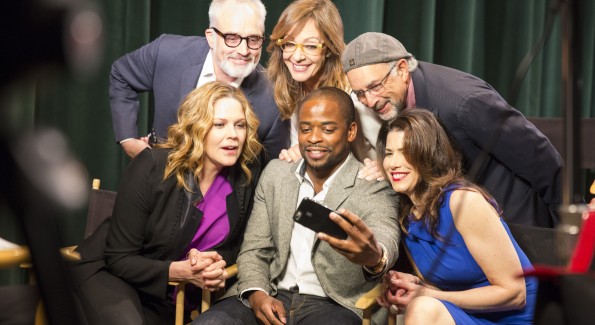Justice For Vets launched its star-studded PSA in Burbank, CA.
By Claire Handscombe

Justice For Vets launch their West Wing PSA supporting Veterans Treatment Courts at Warner Bros. Studios on Tuesday, March 8, 2016 in Burbank, CA with Bradley Whitford, Allison Janney, Richard Schiff, Mary McCormack, and Dulé Hill, alongside Justice For Vets Senior Director Melissa Fitzgerald (Colin Young-Wolff/AP Images for Justice for Vets)
“Never doubt that a small group of thoughtful and committed citizens can change the world,” says Martin Sheen as President Bartlet in an episode of The West Wing. Arguably, the show itself has done rather a lot of that world-changing. But ten years – ten years, already! – after the last episode aired, the cast continue to inspire and provoke us with their own thoughtful commitment to causes which matter to them.
Melissa Fitzgerald played Carol, the assistant to Press Secretary CJ Cregg (Allison Janney). In 2013, she moved to the DC area to take up a new job as Senior Director of Justice for Vets, an organisation which promotes and resources Veterans Treatment Courts. These courts are a lifeline for veterans, many of whom struggle with post-traumatic stress and brain injury when they return home after serving, often using drugs and alcohol to self-medicate. Through structure, treatment, and mentoring, Veterans Treatment Courts help them to avoid the destructive spiral of incarceration, homelessness, addiction, and sometimes suicide. Instead, veterans get their lives back on track.
When Fitzgerald asked her West Wing friends to help out with a PSA for Justice for Vets, they rallied around her. “She’s a force to be reckoned with,” Dulé Hill (Charlie Young) told Washington Life at the launch event on March 8th, 2016. “She’s always been the heart of our cast and is always putting her feet on the ground and actually getting out there and doing something – so whenever she calls I always do my best to answer. But then when she told me the reasons behind it, I think it’s the least that we can do. Entertainment has a megaphone.”
For Bradley Whitford, the reasons are more personal. “My father was a veteran,” he says. “When these things come up, I respond to them. And this is just such low-hanging fruit in terms of the type of thing that you can do that is obviously the right thing to do. It happens to make economic sense but is so clearly the right thing to do.”
He’s right: Veterans Treatment Courts make plenty of economic sense. They have kept over ten thousand vets out of prison and help them lead productive lives in their communities. Secretary McDonald, who leads the VA, agrees. “The rate of return is phenomenal,” he said at the PSA launch, adding, “not just financial, but human.”
Sgt Tommy Rieman received a Silver Star and a Purple Heart for his service in Iraq. After returning home, he struggled to cope, and became addicted to drink and drugs. Thanks in large part to Justice For Vets, he is now clean and sober and, as an active member of the military community, helps to raise awareness of PTSD and life after injury. Rieman was among those who spoke on the panel of the PSA launch at the Warner Brothers lot in Burbank, California. “I’m a thirty-five-year-old balding alcoholic who never thought he’d make it to Hollywood,” he joked. But he also spoke more soberly – and movingly – about the impact of a Veterans Treatment Court on his life. “I had a second chance because of people that cared,” he said. “Melissa reached out to me. She listened. Sometimes that’s all it takes: listening.”
Allison Janney also praised the work of Justice For Vets. “It’s a great organisation and a great cause and I don’t know how I would have found my way to extending help to them had it not been for Melissa Fitzgerald. So I’m grateful to her, because I feel sometimes in my life as an actress that I don’t do enough to help and to honour our troops. Being part of a show like West Wing, it seems like it fits for us to band together and speak out, advancing organisations that do make the world better, especially for our troops.”
Mary McCormack (Kate Harper) agrees. “It’s a way to bring issues into people’s homes,” she says of The West Wing, regarding its role in highlighting important topics. “I wish it was still on – I would watch it.”
It’s safe to say that she speaks for many of us on that front.
